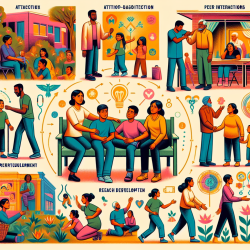In the realm of mental health interventions, the importance of culturally responsive and community-driven approaches cannot be overstated. The research article titled "Saving a Seat at the Table for Community Members: Co-Creating an Attachment-Based Intervention for Low-Income Latinx Parent-Youth Dyads Using a Promotor/a Model" sheds light on a transformative approach that leverages the insights and experiences of community members to enhance mental health outcomes. This blog explores the key findings from the study and offers practitioners actionable insights to improve their skills and interventions.
The Power of Co-Creation
The study highlights the significance of involving community members, specifically promotors, in the co-creation and implementation of attachment-based interventions. Promotors are trained community workers who act as bridges between their communities and formal healthcare providers. Their involvement ensures that interventions are culturally relevant and resonate deeply with the target population.
Key Findings from the Research
- Positive Group Dynamics: The study found that promotors perceived group dynamics as positive, particularly in mother groups where there was lower conflict and higher engagement compared to youth groups.
- Cultural Relevance: The integration of cultural values such as familismo, which emphasizes close family relationships, was crucial in enhancing the intervention's effectiveness.
- Promotor Engagement: Promotors reported feeling valued and included in the co-design process, which contributed to their commitment and investment in delivering the intervention.
Implementing Community-Driven Interventions
For practitioners looking to implement similar interventions, there are several strategies that can be adopted based on the study's findings:
1. Foster Strong Community Partnerships
Building strong partnerships with community organizations is essential. This involves respecting and valuing the input of community members throughout the intervention design and implementation process. Such partnerships ensure that interventions are tailored to meet the specific needs of the community.
2. Embrace Cultural Values
Cultural values should be at the forefront of intervention design. Understanding and integrating these values can enhance engagement and effectiveness. For Latinx communities, emphasizing familial bonds and support networks is crucial.
3. Engage Youth Creatively
Youth engagement can be challenging but is vital for successful outcomes. Incorporating creative elements such as multimedia activities can make interventions more appealing to younger participants.
4. Provide Ongoing Support
The study underscores the importance of continuous support for both participants and promotors. Providing additional training for promotors on trauma-informed care can equip them to handle sensitive topics effectively.
The Broader Impact
The implications of this research extend beyond individual interventions. By empowering promotors and integrating community insights, practitioners can contribute to reducing mental health disparities in underserved communities. This approach not only enhances individual outcomes but also strengthens community resilience.
To read the original research paper, please follow this link: Saving a seat at the table for community members: co-creating an attachment-based intervention for low-income Latinx parent-youth dyads using a promotor/a model.










